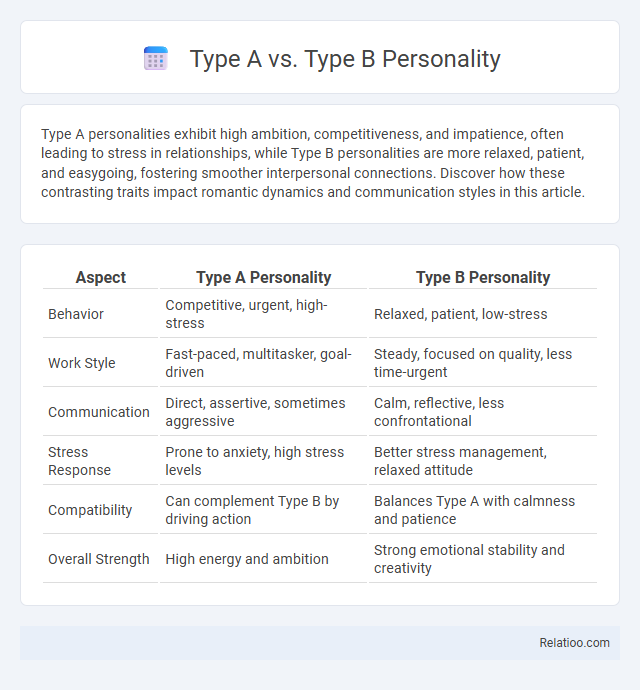Type A personalities exhibit high ambition, competitiveness, and impatience, often leading to stress in relationships, while Type B personalities are more relaxed, patient, and easygoing, fostering smoother interpersonal connections. Discover how these contrasting traits impact romantic dynamics and communication styles in this article.
Table of Comparison
| Aspect | Type A Personality | Type B Personality |
|---|---|---|
| Behavior | Competitive, urgent, high-stress | Relaxed, patient, low-stress |
| Work Style | Fast-paced, multitasker, goal-driven | Steady, focused on quality, less time-urgent |
| Communication | Direct, assertive, sometimes aggressive | Calm, reflective, less confrontational |
| Stress Response | Prone to anxiety, high stress levels | Better stress management, relaxed attitude |
| Compatibility | Can complement Type B by driving action | Balances Type A with calmness and patience |
| Overall Strength | High energy and ambition | Strong emotional stability and creativity |
Introduction to Type A and Type B Personalities
Type A personalities are characterized by high levels of competitiveness, impatience, and a strong sense of urgency, often leading to stress and a fast-paced lifestyle. Type B personalities tend to be more relaxed, patient, and easy-going, exhibiting lower stress levels and a more balanced approach to life. Understanding these personality types helps You recognize how individuality shapes behavior patterns and influences personal and professional interactions.
Defining Characteristics of Type A Personality
Type A personality is defined by high competitiveness, a constant sense of urgency, and a strong drive to achieve goals, often accompanied by impatience and aggression. Unlike Type B personality, which tends to be relaxed and less stressed, Type A individuals experience higher stress levels and are more prone to health issues like heart disease. Understanding these defining characteristics helps you recognize how Type A traits influence behavior and overall well-being.
Defining Characteristics of Type B Personality
Type B personalities are characterized by a relaxed, patient, and easy-going demeanor, often displaying lower stress levels compared to their Type A counterparts. They tend to have a more flexible approach to time management and work, prioritize creativity and social interactions, and avoid competitive or aggressive behavior. This personality type emphasizes individuality through adaptability and emotional steadiness rather than the urgency and high achievement associated with Type A traits.
Key Differences Between Type A and Type B
Type A personalities are characterized by high competitiveness, urgency, and a constant drive for achievement, often leading to stress and impatience. In contrast, Type B personalities exhibit a relaxed, patient, and easy-going demeanor, prioritizing balance and stress management. Individuality manifests uniquely within these types, reflecting personal values and coping mechanisms beyond the generalized Type A and Type B traits.
Impact on Work Performance and Career
Type A personalities, characterized by high ambition and competitiveness, often excel in fast-paced, high-pressure work environments, driving productivity and career advancement. In contrast, Type B individuals exhibit a more relaxed, patient approach, fostering creativity and collaboration but potentially struggling with strict deadlines. Understanding Your unique personality type helps tailor work strategies to maximize performance and achieve sustainable career growth.
Stress Management: Type A vs Type B
Type A personalities exhibit high stress levels due to their competitive and time-urgent nature, often leading to increased heart disease risk, whereas Type B personalities typically experience lower stress and a more relaxed approach to life, contributing to better stress management and emotional health. Individuality plays a critical role in stress response, as personal coping mechanisms and lifestyle choices influence how each person, regardless of personality type, manages stress effectively. Tailoring stress reduction techniques to one's unique traits improves overall well-being and resilience against stress-related health issues.
Health Implications for Type A and Type B Personalities
Type A personalities are characterized by high stress, competitiveness, and urgency, which increase the risk of cardiovascular diseases and hypertension. Type B personalities tend to exhibit calmness and lower stress levels, promoting better mental health and reduced risk of stress-related illnesses. Understanding Your personality type helps tailor lifestyle changes to improve your overall health outcomes effectively.
Personality Types in Relationships and Social Life
Type A personalities often exhibit competitive and high-achievement traits, which can lead to stress in relationships, while Type B personalities tend to be more relaxed and sociable, fostering harmonious social interactions. Understanding these personality types helps in navigating conflicts and enhancing communication in romantic and social settings. Emphasizing individuality within these types allows for personalized approaches to relationship dynamics, promoting empathy and mutual respect.
Personality Assessment: Identifying Your Type
Personality assessment tools effectively distinguish between Type A and Type B personalities by measuring traits such as competitiveness, stress response, and social behavior. Type A individuals typically exhibit high levels of ambition, urgency, and hostility, whereas Type B personalities show more relaxed, patient, and easy-going tendencies. Understanding these distinctions aids in recognizing individuality within personality frameworks, supporting tailored personal development and mental health strategies.
Tips for Balancing Type A and Type B Traits
Balancing Type A and Type B personality traits involves integrating the goal-driven, competitive nature of Type A with the relaxed, creative qualities of Type B. You can enhance productivity by setting structured goals while allowing flexibility to reduce stress and foster innovation. Practicing mindfulness and scheduling regular breaks supports emotional regulation and helps maintain this equilibrium effectively.

Infographic: Type A vs Type B Personality
 relatioo.com
relatioo.com